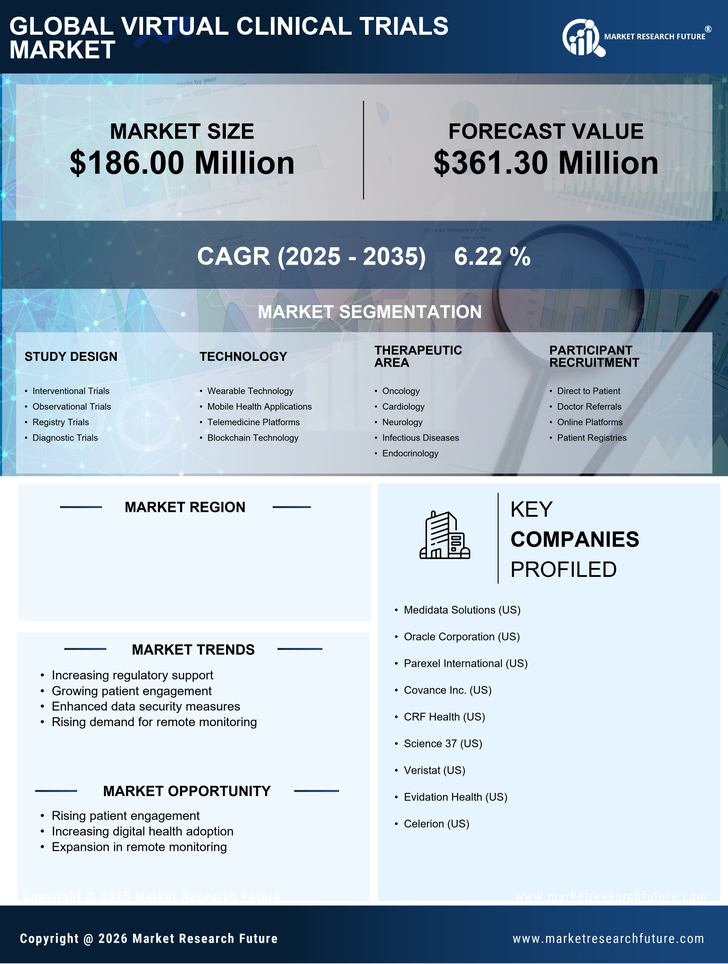Enhanced Data Collection and Analytics
The virtual clinical-trials market benefits from advancements in data collection and analytics, which are crucial for improving trial outcomes. The integration of wearable devices and mobile applications allows for real-time data gathering, providing researchers with comprehensive insights into patient health and behavior. This capability enhances the quality of data collected, leading to more accurate results and faster decision-making. In the GCC region, the increasing focus on data-driven approaches in healthcare is likely to propel the virtual clinical-trials market forward. Enhanced analytics tools can also facilitate better patient stratification and personalized treatment plans, further driving the demand for virtual trials as a viable alternative to traditional methods.
Cost Efficiency and Resource Optimization
Cost efficiency is a pivotal driver in the virtual clinical-trials market, particularly within the GCC region. Traditional clinical trials often incur substantial expenses related to patient recruitment, site management, and logistics. In contrast, virtual trials leverage technology to reduce these costs significantly. By utilizing digital platforms for patient engagement and data collection, organizations can optimize resources and minimize overhead. Reports suggest that virtual trials can reduce operational costs by up to 30%, making them an attractive option for sponsors and researchers. This financial advantage is likely to encourage more stakeholders to invest in the virtual clinical-trials market, thereby accelerating its growth and adoption across the region.
Increased Demand for Remote Healthcare Solutions
The virtual clinical-trials market is experiencing a surge in demand for remote healthcare solutions, driven by the need for accessible and efficient patient engagement. As healthcare systems in the GCC region evolve, there is a growing emphasis on minimizing patient travel and maximizing convenience. This shift is reflected in the increasing adoption of telemedicine and digital health platforms, which facilitate remote monitoring and data collection. According to recent estimates, the virtual clinical-trials market is projected to grow at a CAGR of approximately 15% over the next five years, indicating a robust expansion fueled by the desire for innovative healthcare delivery models. The integration of remote healthcare solutions not only enhances patient participation but also streamlines trial processes, making them more efficient and cost-effective.
Regulatory Evolution and Support for Digital Trials
The regulatory landscape surrounding clinical trials is evolving, with increasing support for digital methodologies. Regulatory bodies in the GCC are beginning to recognize the potential of virtual trials to enhance efficiency and patient safety. This shift is likely to foster a more favorable environment for the virtual clinical-trials market, as guidelines and frameworks are developed to accommodate digital approaches. The establishment of clear regulatory pathways can encourage investment and innovation in virtual trial technologies. As regulatory support strengthens, stakeholders may feel more confident in adopting virtual methodologies, thereby accelerating the growth of the market in the region.
Growing Interest in Patient Recruitment and Retention
Patient recruitment and retention remain critical challenges in clinical trials, and the virtual clinical-trials market offers innovative solutions to address these issues. The use of digital platforms enables researchers to reach a broader audience, thereby increasing the likelihood of enrolling diverse patient populations. In the GCC, where cultural and logistical barriers can hinder participation, virtual trials present a compelling alternative. By simplifying the recruitment process and providing flexible participation options, the virtual clinical-trials market is likely to enhance patient retention rates. This focus on patient-centric strategies is expected to attract more sponsors and researchers, further stimulating market growth in the region.

















